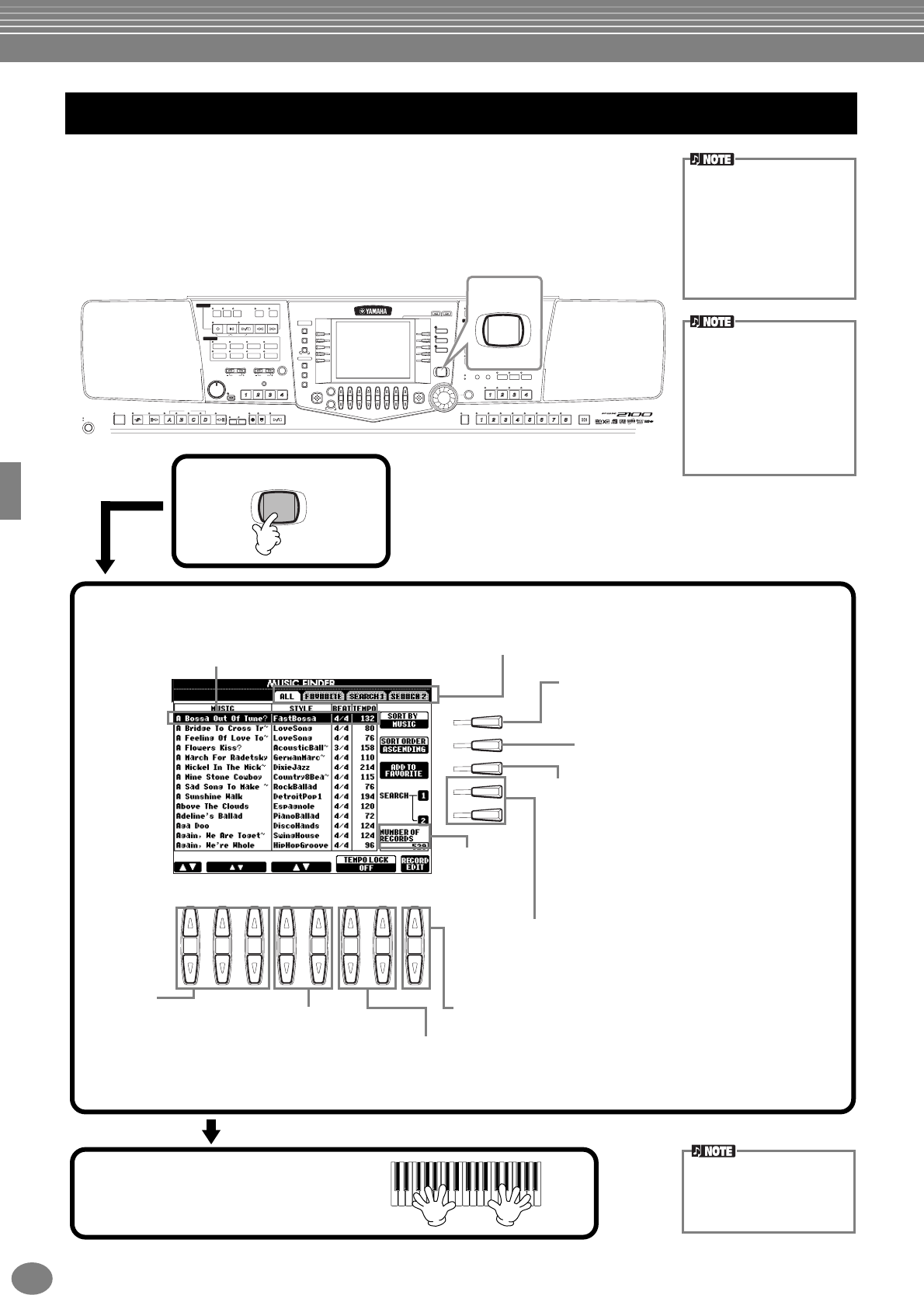
Styles
PSR-2100/1100
72
The Music Finder feature lets you instantly call up the appropriate settings for the
instrument — including voice, style, and One Touch Settings — simply by selecting the
desired song title. If you want to play a certain song but don’t know which style and voice
settings would be appropriate, the convenient Music Finder function will help you out.
The recommended settings, which together make up a “record,” can also be edited and
stored. This lets you create and save your own Music Finder records for future recall.
Calling Up Ideal Setups for Your Music — Music Finder
The MUSIC FINDER
records and its contents is
just one example of the rec-
ommended panel setups.
You can also create your
own Music Finder settings
for your favorite songs and
genres.
Keep in mind that Music
Finder is a performance aid
in that it automatically finds
appropriate accompaniment
styles and voices for your
playing. Even though you
can specify song titles, it
does not actually contain
song data.
USER
ENTER
EXIT
BALANCE
FUNCTION
HELP
MENU
DEMO
SOUND CREATOR
DIGITAL RECORDING
MIXING CONSOLE
DIGITAL
STUDIO
DIRECT
ACCESS
PART
CHANNEL ON/OFF
FREEZE MEMORY
DATA ENTRY
ORGAN FLUTES
STRINGS CHOIR & PAD
GUITAR
MAIN
BACK NEXT
LEFT
MUSIC
FINDER
LAYER
I
F
J
G
H
D
A
E
B
C
BASS
PIANO & HARPSI.
E.PIANO
XG
UPPER OCTAVE
WOODWIND
PERCUSSION
VARIATION
MONOTOUCH
SUSTAIN
DSP
HARMONY/
ECHO
LEFT
HOLD
SYNTH.
BRASS
ORGAN &
ACCORDION
VOICE EFFECT
VOIC E
ONE TOUCH SETTING
REGISTRATION MEMORY
MIC.
EFFECT
RESET
VOCAL
HARMONY
MIC.
SETTING
VH TYPE
SELECT
TALK
OVER
SIGNAL
TRANSPOSE
ACMP
STANDBY
ON
INTRO
START/STOP
MAIN
ENDING
/ rit.
AUTO
FILL IN
OTS
LINK
SYNC.
STOP
SYNC.
START
BREAK
BALLAD USERLATIN
POP & ROCK
REC REW FF
START/STOP
TOP
BALLROOM
DANCE
RESET
MIN MAX
FADE
IN/OUT
TEMPO
STOP
TAP TEMPO
RESET
NEW SONG SYNC. START
SONG
STYLE
MARCH &
WALTZ
METRO-
NOME
EXTRA
TRACKS
(STYLE) (R)(L)
TRACK
2
TRACK
1REPEAT
SWING &
JAZZ
MULTI PAD
STYLE CONTROL
MASTER VOLUME
PART
MUSIC
FINDER
I
F
J
G
H
MUSIC
FINDER
Select a record. For example, select the top
record by pressing the [1▲▼] button to call up
the recommended setups.
The setting data shown here is referred to as a
“record.”
All...........................Show all records.
FAVORITE..............Show the records that have added to the “Favorite” page.
SEARCH1,2...........Show the results by SEARCH function (page 73).
Sorting the records
MUSIC.......The record is sorted by song title.
STYLE.......The record is sorted by style name.
BEAT.........The record is sorted by beat.
TEMPO .....The record is sorted by tempo.
Change the order of the records
(ascending or descending).
Add the selected record to “Favorite (Bookmark)” page
When you press the [H] button, the “Add selected
data to the favorite list? YES/NO” message will be
displayed. Select [YES] to add the selected page to
“FAVORITE” page.
To delete the added record, select the record in the
“FAVORITE” page and press the [H](DELETE
FROM FAVORITE) button.
Search record(s). Enter the condition of the search in the
MUSIC FINDER SEARCH display (page 73). The results of
SEARCH 1 or 2 appear in the “SEARCH 1” or “SEARCH 2”
page respectively.
Call up the MUSIC FINDER RECORD EDIT (page 74) display (for
editing the selected record).
Turn TEMPO LOCK on/off. TEMPO LOCK function lets you avoid changing
the Tempo during style playback when selecting another record. The on/off
setting affects all pages (ALL/FAVORITE/SEARCH 1/SEARCH 2).
Select a record by style name. When
sorting the records by style name,
press these buttons to move the cursor
to the next /previous style.
Simultaneously press the [▲▼] buttons
to move the cursor to the first record.
Select a
record by
song title.
When sorting
records by
song title, use
the [1▲▼] but-
ton to skip up
or down
through the
songs alpha-
betically.
Simulta-
neously press
the [▲▼] but-
tons to move
the cursor to
the first
record.
Show the
number of
records of
each page.
1
2
3
Play the style (page 63).
Records can be selected by
using the [DATA ENTRY]
dial and pressing the
[ENTER] button.
